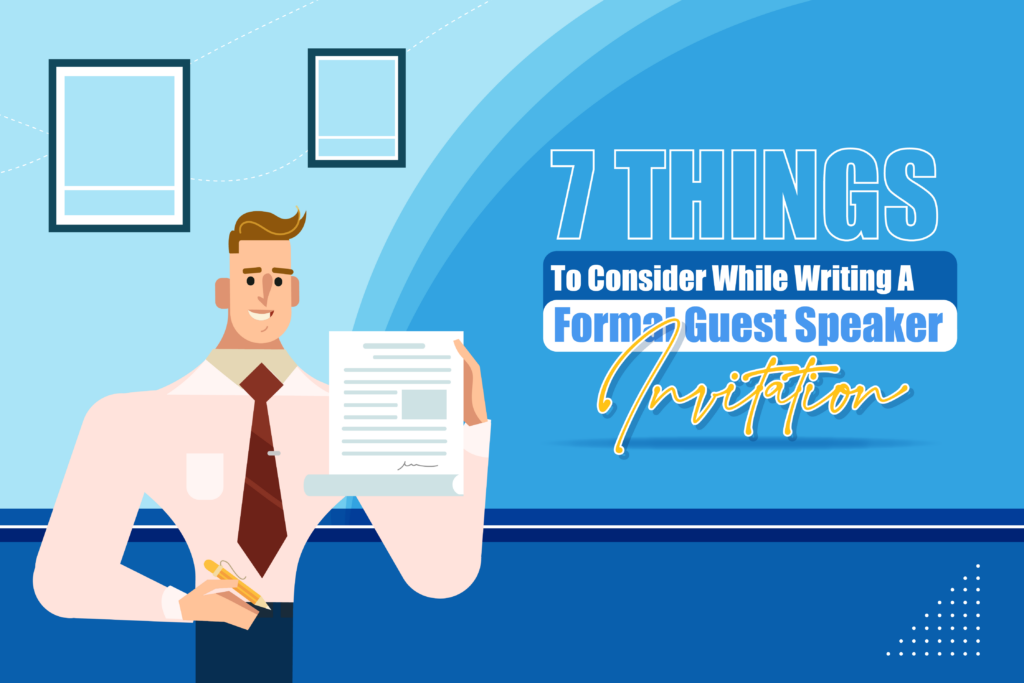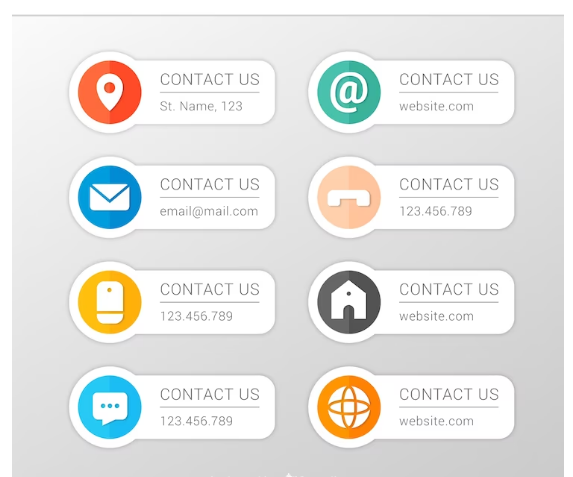
Choosing the right guest speakers is one of the most important aspects of organizing a conference, workshop, or any other special event.
In this article, let’s take a deep dive into the benefits of writing guest speaker invitation emails, the tips for writing them well, and two sample formal guest speaker invitations to help you get started. Read along!
7 Ways to Write Guest Speaker Invitation Emails:
Your guest speaker invitation emails should contain details about the occasion and speaking opportunity. The event speakers need to know why they would be a good fit for your event and why it would be desirable to add it to their schedule of engagements.
1. Begin with a Polite Greeting
Use the speaker’s full name to address them, followed by a formal salutation like “Dear” or “Hallo”. Be professional in your words and tone. Avoid using colloquial language or slang when addressing the guest speaker or anywhere in the body of the e-mail.
Follow these steps for writing a formal guest speaker invitation letter:
- Subject Line: The subject line should contain the crux of the invitation.
- Include Salutation: Always start your letter with an appropriate salutation. Write the recipient’s name and put their first and last names down on paper along with the title. For example, ‘Dear John Britania. ‘
The salutation should end with a comma and a line break. Always try to get the recipient’s full name before sending a letter.
If you don’t know the recipient’s name, you can use a greeting such as Hello/ Hi/ Dear Madam/Sir, To whom it may concern, or Greeting of the day.
- Address Appropriately: Ensure you investigate how to address the person you are approaching, whether an invitee at a graduation ceremony or a business conference.
- Specify Issuing Date: Do mention the release date of the guest speaker invitation. You can use any format to specify the Date, such as ’10/03/2023′, ’10 March 2023′, or ‘March 10, 2023’.
Use these templates to begin your invitation email:
- We’re happy to have you here.
- Having you as a guest speaker will be an honor for our organization.
- We would be grateful to have you visit.
- Please grace our event.
- We want to welcome you on behalf of our company.
Using sentences like this at the start of the letter shows that you respect and are happy to invite someone to your event.
2. Introduce your Organization
Introduce your company or group and briefly describe what it does.

- Use a Letterhead: Letterheads serve as a formal representation of your company’s existence. This point is crucial when writing a formal invitation. Include your company’s letterhead at the very top of the document.
- Give a brief description of your company: Explain your company briefly. Include information such as its Date of formation, global presence, and available products and services.
- Mention Your Company’s Contact Information: This step is essential since this is the address where guests will email their RSVPs. Before including your letterhead, you must have the company’s contact information.
3. Explain the Purpose of the Event
Clearly describe the purpose and intent of the event, including the time, date, and place. Explain the event’s goals and how the audience will likely benefit from the speaker’s expertise.

Depending on the type of event, set yourself to achieve a particular goal or objective. However, this might vary. The information below might include events such as:
- Providing instructions or training: The event, such as a conference, workshop or seminar, could be created to instruct or teach participants about a specific subject or required role.
- Networking: The event may allow guests to network with others in their field or community members.
- Fundraising: The event’s purpose could be to raise money for a specific cause or group.
- Celebration: These events celebrate achievements or momentous milestones, such as graduation, anniversary, inauguration, or product launch.
- Launching a good or service: A trade exhibition or product launch are examples of such events whose main purpose is to market a specific good or service.
It is crucial to explain the event’s purpose to guest speakers and prospective participants. Having them know the aims and objectives of the event will also help you ensure that everybody is on the same page and pursuing the same goal.
4. Highlight the Speaker’s Expertise
The invited speaker’s distinguished credentials and remarkable accomplishments in their specialized field make them a highly respected and valued addition to our event. With a wealth of experience and expertise, they have established themselves as a recognized authority, earning the trust and confidence of their peers and audiences alike.
Their extensive track record of successful speaking engagements and event-related contributions further exemplifies their reputation as trusted and esteemed professionals in their field.
By highlighting their notable achievements and relevant experience, event organizers can showcase their deep respect and appreciation for their expertise while providing them with a platform to share their invaluable insights and knowledge with their audience.
The following advice can help you draw attention to the speaker’s qualifications:
- Professional background: Describe the speaker’s professional history in detail. You should highlight their relevant experience, education, or certifications.
- Accomplishments: Be sure to call attention to any noteworthy successes or honours the speaker has received, such as articles, research, or a successful project.
- Relevance to the event: Describe how the audience members and the event can benefit from the speaker’s knowledge. It may include particular abilities, information, or perceptions the speaker brings.
- Reputation: Mention the speaker’s status in society or a particular field and any noteworthy contributions they have made.
- Social media presence: If applicable, include the speaker’s social media accounts or personal website to show their online popularity and reach.
- Testimonials: Provide testimonials from previous events or partnerships to highlight the speaker’s worth and knowledge.
Explaining the significance of your event can influence an ideal speaker to accept your invitation. At the same time, you can share their profile on the conference website or social media platforms to attract potential attendees and market the event/conference.
Suppose you invite a business leader to be the keynote speaker at your scheduled event. In that case, your formal speaker invitation letter should include a cover letter expressing the importance of that role.
5. Offer Logistical Information
Describe the event’s logistics, including travel arrangements, hotel accommodations, and other necessary details. If budget constraints are not an issue, include compensation details in your email.

The logistics offer should spotlight the given factors:
- Travel Expenses
- Accommodation if needed
- Any other requirements from the guest’s side
6. Be Courteous and Respectful
Despite their busy schedules, they express gratitude for participating and applaud the engaging speakers for their time.

Keep these points in your mind while concluding your invitation:
- Thank the receiver for taking the time to consider your invitation.
- Say how much you hope to see them at the event. If you plan to speak to the concerned person overall, include the day on which you intend to do so to get a response.
- If you wish the recipient to confirm their attendance through email or by completing a form, include the timeframe by which you expect them to do so.
Once your speaker has accepted, you will likely jump on a phone, email, or Zoom call to discuss the details of your event further.
7. Include Contact Information
Provide the potential speakers with your contact information and encourage them to contact you if they have any concerns or queries.
Pic Courtesy: Freepik
If you are sending a formal invitation letter on behalf of your organization, add your designation. This will make it simple for anyone to contact you with inquiries about your event.
Check these things before hitting the send button:
- Before sending your business letter, give it one more review.
- Verify that the spelling is accurate, the grammar is acceptable, and the punctuation is appropriate.
- Ensure that your writing is free of jargon and incomplete sentences.
Ensure you contact the invitee again after emailing to get any updates after their availability confirmation. A prompt and polite follow-up can improve an adequate response.
Whether or not the guest speaker accepts your invitation, please show your appreciation for their time and thoughtfulness. Thank them for considering your suggestion and for their work in the field.
Prepare for the worst-case scenario:
It would be best if you started reaching out to possible speakers well in advance. Your guest speaker list may include the company CEO, Director, founder, expert from the Sales, IT, or Marketing department or a celebrity/social media influencer. Approaching them may look daunting, but being prepared with a backup plan can save you.
- Invite your preferred guests: This phase should include first-choice speakers. Notify them as soon as possible so that they can ensure they are available for your event and don’t get caught up in their busy schedule. If someone doesn’t respond, feel free to give them a gentle and polite reminder. If the first group of speakers denies your request, send a warm ‘thank you’ to consider the invitation and move on.
- Invite your second-choice guest: Do not feel disheartened by getting rejected; prepare yourself with a second-batch list. Send an invitation to your alternative-choice speakers/ backup speakers.
You can build an event website and share it in your invitation. Having such an approach to inviting guest speakers is a reliable action plan.
Benefits of Writing Guest Speaker Invitation Emails
Inviting guest speakers to events, conferences, or webinars can have numerous benefits for both the host and attendees. A guest speaker at your event might enhance the overall attendee experience, and the name of a reputable guest speaker alone can boost the credibility of your conference or webinar.
Guest speakers bring a wealth of knowledge and expertise, which may boost attendance at your event and help your attendees get valuable insights. More often than not, guest speakers also help provide relevant content for future marketing materials or social media posts, which increases event visibility, enhances the attendee experience, and potentially increases event ROI, all of which can contribute to increased audience turnaround the following year.
Thus, we see how inviting guest speakers can add significant value to an event, conference, or webinar, helping in different ways to engage attendees, establish credibility, and create opportunities for future growth and success.
Please look at the sample guest speaker invitation letters we have drafted below. We hope they will help you write one accordingly.
Guest Speaker Invitation Letter Sample 1:
Dear [Name of a Guest Speaker],
I’m writing to extend a speaking invitation to you for our upcoming [Trade Expo Event] on [Event Date] at [Event Location]. We [briefly describe your organization’s mission] as [Organization Name].
Your vast experience in [Guest Speaker’s Field] would benefit our audience significantly, and we would be honored if you could join us. Your depth of knowledge in [Speaker’s Area of Specialisation] would be a great asset to our event.
Our audience comprises [Target Audience], and your insights and perspectives would be particularly relevant to them.
We would be pleased to pay for any necessary lodging or travel costs. If you require any particular arrangements, do let us know.
Thank you for considering our invitation. We appreciate your positive response.
Best regards,
[Your Name]
[Designation & Company name with logo]
[Your Contact Information]
Guest Speaker Invitation Letter Sample 2:
Dear [Guest Speaker Name],
I’m inviting you to talk at our forthcoming [event name] on behalf of [Name of Institution]. Your knowledge and experience in this area would be constructive for our students, eager to learn more about [Topic].
The gathering will take place at [Venue] on [Date] and last for [Duration]. We look forward to having the [number of attendees] faculty members and pupils present.
We’d like to hear from you for [Duration] minutes on [Specific Subject]. We will happily provide materials or tools to help you prepare for your talk.
Although we know how busy you are, it would be an honor if you could join us as a guest speaker. We would gladly pay for your travel costs and any additional expenses you may have.
We appreciate your consideration of our offer and look forward to hearing from you.
Warm regards,
[Your Name]
[Designation & Institute logo]
[Your Contact Information]
Key Takeaway
Our blog has everything you need to write your guest invitation letters correctly. We hope you consider everything and draft a letter that assures your guest speakers that they’re in good hands. When you take care of the nitty-gritty, you will likely get an optimistic response.
Inviting a guest speaker is a great chance to gain in-depth knowledge and insights about a particular topic that the speaker is an expert in. It also provides opportunities for attendees to network with and establish valuable connections for future collaborations.
They can offer a distinctive viewpoint, encouraging participants to gain a fresh perspective and act accordingly to meet the desired goal. A good speaker will also ensure you get maximum participation, which is only likely to improve the event’s or organization’s reputation.
Suppose you are an event organizer looking for esteemed speakers from diverse fields and genres. In that case, Eventible’s Gazebo Speaker Directory will help you find passionate and experienced people to speak at your next event. You can write a great guest speaker invitation email per the recommendations and tips above to invite the best speakers from across industries. Likewise, if you are a speaker and wish to create a page for yourself on Eventible’s Gazebo Speaker Directory, fill out this Google form!








Comments are closed.